
by Steve | Aug 31, 2016 | July-Aug2016, Magazine, Magazine Articles
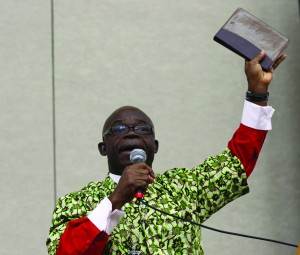
The Rev. Jerry Kulah preaches during the African central conference worship service during General Conference. Photo by Kathleen Barry, UMNS.
A Message from the UMC Africa Initiative
We have been following the events and activities of the five jurisdictions of The United Methodist Church with mixed emotions and serious concerns about the future of our beloved church. We have read of actions taken by some in gross disobedience to the Bible and our Book of Discipline, and of others who have written to express their disagreements. We are deeply concerned. However, we are praying for God’s intervention as we discern God’s plans for the future of our church.
It is shockingly amazing that in the letter sent to the Council of Bishops from the organization called “Love Prevails” prior to the 2016 General Conference there was no mention of a specific reference to any passage of the Holy Scripture, our primary authority for doctrine, faith, and Christian living as the Church of Jesus Christ, to support any of its claims, arguments, and demands and justifications for the actions it has taken in recent times. This attitude and behavior has the propensity to embarrass, ridicule, and blur the message of the liberating Gospel of Jesus Christ, which alone has the power to save and transform society.
In light of the commitment we (African delegates to the 2016 General Conference) made to the request of the Council of Bishops by our support to have them set up a special Commission to inquire into all human sexuality issues contained in our Book of Discipline, many of us are deeply saddened by the actions of some of our brothers and sisters to attempt to derail the unity of global Methodism. Their actions to grossly disrespect our bishops and disobey our global decision at the 2016 General Conference are incompatible with fostering unity within global Methodism.
Furthermore, their actions seem to confirm the fears of our founding father, John Wesley. About five years before his demise, Wesley had expressed his fears about the future of our church in regards to its continued commitment and submission to the Scripture and discipline that govern us. He said, “I am not afraid that the people called Methodist should ever cease to exist either in Europe or America [in Africa and the rest of the world]. But I am afraid, lest they should only exist as a dead sect, having the form of religion without the power. And this undoubtedly will be the case, unless they hold fast both to the doctrine, spirit and discipline with which they first set out.”
When we abandon the clear teaching of Scripture in favor of some philosophies and ideologies of contemporary society, we cease to exist within God’s parameter of grace.
We are left to wonder, why are we not identified as Muslims, Buddhist, Hindus, etc., but Christians? It is because every religious faith has a doctrine and a religious code of conduct that distinguishes it from all other religions. In the case of Christianity, it is the Bible, the Holy Word of God, as the Quran is for the Muslims. One’s religious identity is not found in the most appealing cultural or political system of the day, for that is fleeting. Loyalty, obedience, and submission to the teachings of these “divine writings” of the faith to which one belongs defines, distinguishes, and truly identifies adherents. One cannot claim to truly be a member of any of the world’s religions and live in gross disobedience to its teachings (John14:15; Psalm 119:9-11,105; 19:7-11).
Let the church be the church; and let not the culture of the day define the global Christian community called United Methodist, but the Bible (Joshua 1:8; 2 Timothy 3:16-17).
The Christian Church, bought and birthed with the blood of Jesus Christ (Isaiah 53:1-13; Matthew 27: 32-61; John 10:10-11; Hebrews 10:1-39) is not and cannot be a social club; it cannot be directed by any form of political activism that contradicts the teachings of Scripture. And it is not a social or political system based on humanism or secular ideologies and philosophies (2 John 2;15-16; Colossians 2: 8-15;1 Samuel 8) that seeks endorsement for a kind of “human rights” to the detriment of human existence as God our Creator has designed it. Instead, the Church of Jesus Christ is a global community redeemed by the blood of Jesus Christ, who lives in loving relationship with their Lord and Savior, Jesus Christ. They are a people called out from the world and yet sent into the world (John 16:7-11; Acts 1:8; Genesis 6:5-9; Deuteronomy 6:4-9; 28; Judges 2:10-13; 17:6) to share the Gospel in the power of the Holy Spirit in order that persons might come to faith in Christ and become disciples of Jesus Christ for the transformation of the world. We cannot in any way be “bad news” by our decisions, actions, and attitudes, and yet attempt to proclaim the good news.
It is time to return to the faith of our fathers and mothers (the Holy Scriptures) and be the church. In spite all that is going on, there is hope for the continued growth and development of the Church of Jesus Christ because Jesus is still the Lord of His Church. We will remain committed and determined to live in loyalty and obedience to the teachings of the Holy Scriptures, and to our Book of Discipline.
We will also remain supportive of the unity of the global United Methodist Community as long as the Bible remains our primary authority for faith and Christian living. We shall remain loving of members of the UM Church who have chosen to tread the cultural path of contemporary society that is inimical to the teaching of Scripture, in the hope that we will reconcile our differences and submit to the Lordship of Christ. They are our brothers and sisters for whom Christ also gave his life. However, we shall not compromise our Christian faith on the altar of what seems to the minds of some to be “socially acceptable and politically correct” cultures and practices of contemporary society.
We are confident that God is in sovereign control of His Church. He promises to continually build it until He returns to receive us unto Himself, and the gates of hell shall not prevail against it (Matthew 16:18b). We need to only be still, yet vigorously prayerful and discerning in such a time as this, and we will see the deliverance of the Lord.
We must admit that the global United Methodist Church is at the crossroads (Jeremiah 6:16). We have choices to make. On one hand, we can choose to obey God and His word, and thereby repent of the sin of gross disobedience and abandon the quest to be like the rest of the world. On the other hand, we can choose to continue in pursuit of what the cultural practices of the day dictate that denies God’s sovereignty over God’s creation and accepts what feels good, what seems politically acceptable to society, etc. The choice is ours.
But as Joshua, at the close of his ministry in Shechem, said to all of the Israelites, and by implication to all United Methodist at the crossroads today, we wish to challenge all born-again believers in Jesus Christ (John 3:3-5), in the words of this great general of God’s people, “Now fear the Lord and serve him with all faithfulness…But if serving the Lord seems undesirable to you, then choose for yourselves this day whom you will serve…But as for me and my household – the UM Community in Africa, in particular, and all faithful Christians everywhere who are committed to the Lordship of Jesus Christ and the undiluted Word of God for belief and practice – we will serve the LORD” (Joshua 24:14-15).
Together, we shall make it for God’s glory (Joshua 2:17-18; 2 Samuel 10:9-12). God has wonderful plans for the prosperity of His Church on earth (Jeremiah 29:11). Let us be firm and very courageous in prayer and in discerning God’s will for the future of our church, always abounding in the Word of the Lord; for we know our labor in the Lord is not in vain (Joshua 1:4-6; 1 Corinthians 15:58). May God bless the people called United Methodist.
The UMC Africa Initiative is a coalition of United Methodist leaders in Africa who were elected to the 2016 General Conference. This message was written by Rev. Dr. Jerry P. Kulah on behalf of the UMC Africa Initiative. Kulah is the West Africa Central Conference Coordinator of the UMC Africa Initiative and the dean of the Gbarnga School of Theology, a United Methodist seminary in Liberia.

by Steve | Aug 31, 2016 | July-Aug2016, Magazine, Magazine Articles
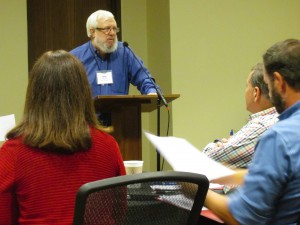
Dr. William J. Abraham, professor at Perkins School of Theology in Dallas, addresses the Wesleyan Covenant Association gathering.
WCA Press Release
The newly launched Wesleyan Covenant Association (WCA) is a membership-driven initiative to link congregations, clergy persons, and laity to “promote the ministry of the gospel from a Wesleyan theological perspective within The United Methodist Church and kindred bodies,” according to bylaws adopted by nearly 50 United Methodist leaders gathering in Houston on August 1 and 2.
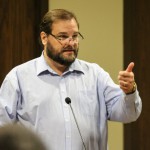
Dr. Chris Ritter
“We are a movement of like-minded, warm-hearted, Jesus loving, Wesleyan, evangelical, orthodox, and covenant-keeping Christians who are connected together in mission,” said the Rev. Dr. Jeff Greenway, lead pastor of Reynoldsburg (Ohio) United Methodist Church.
The group gathered to adopt bylaws and nominate a first slate of Council members that will be elected at their initial public gathering on October 7 in Chicago at the Donald E. Stephens Convention Center. Information on the Chicago event can be found online at WesleyanCovenant.org.
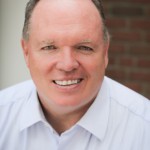
Rev. Jeff Greenway
“Our meeting was both serious and hopeful,” said Dr. David Watson, academic dean at United Theological Seminary in Dayton, Ohio. “We prayed together, broke bread, shared ideas, agreed and disagreed, and learned from each other. We affirmed together that we are not another caucus group, but a community established for mutual encouragement, resourcing, and accountability. We simply want to embody Wesleyan holiness in a way that is already articulated in United Methodism’s Doctrinal Standards, but is often set aside in actual practice.”
In addition to Watson, other prominent United Methodist theologians in the group included Dr. Billy Abraham of Perkins School of Theology in Dallas and Dr. Bill Arnold of Asbury Theological Seminary in Wilmore, Kentucky. There were clergy and laity representatives from all five jurisdictions in the denomination, including from embattled annual conferences such as Rocky Mountain, New York, and Iowa.
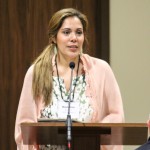
The Rev. Madeline Carrasco Henners
“As a young orthodox United Methodist, I am excited about the creation of the Wesleyan Covenant Association as a coalition committed to the authority of God’s Holy Word, our Wesleyan heritage, and Holy Spirit empowered revival,” said the Rev. Madeline Carrasco Henners, pastor of Luling (Texas) First United Methodist Church. “We know that many pastors in many progressive annual conferences feel isolated from their fellow orthodox brothers and sisters. This alliance will help them have their voices heard in matters affecting the unity of the global church.”
Morning devotional messages were brought by the Revs. Ryan Barnett, Kerrville (Texas) United Methodist Church, and Carolyn Moore, senior pastor of Mosaic United Methodist Church in Evans, Georgia. The concluding service of holy communion was conducted by Henners and the Rev. Jessica LaGrone, dean of the chapel at Asbury Theological Seminary.
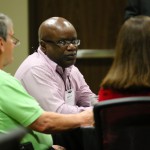
The Rev. Kenneth Levingston (center)
The group established that one of its main purposes was to “promote the worship of the Holy Trinity, to preach the pure Word of God, to uphold the rich tradition of sacramental practice, to maintain Christian fellowship, to foster the edification of believers, and to welcome and advance the work of the Kingdom of God on earth.”
“During this time of so much uncertainty in United Methodism, the Wesleyan Covenant Association is bringing a fresh voice of hope, strength, and encouragement to those seeking traditional Biblical values,” said Jennifer Cowart, executive pastor at Harvest Church in Warner Robbins, Georgia.
“The United Methodist Church has a rich heritage of reaching people for Christ and helping them grow into mature disciples. However, we now find ourselves at a crossroads of what the future holds for our tribe. The WCA provides a network of like minded laity and clergy who cherish biblical traditional values.”
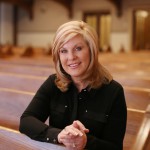
Jennifer Cowart
An erroneous report on the online version of Charisma magazine claimed that the WCA was ready to create a new denomination. Charisma issued a second story to correct their faulty reporting. Furthermore, Bishop Bruce Ough, president of the United Methodist Council of Bishops, inappropriately blamed the formation of the Wesleyan Covenant Association as having “opened deep wounds and fissures within The United Methodist Church and fanned fears of schism.” (See page 24.)
Leaders at the event agreed that both cases of severe mischaracterization should be retracted and corrected.
“Some have jumped to the conclusion that the formation of the Wesleyan Covenant Association is an effort to force schism and start a new denomination,” said Greenway. “I can understand why some might say that because these are confusing times and many forces are at play in the United Methodist family trying to shape what is to come. I can say unequivocally that we are not creating or starting an effort to leave our denomination, but we are developing an association of churches and leaders who are committed to live and practice what we say we believe.”
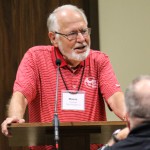
Dr. Maxie Dunnam
Those in attendance at the meeting want to be active in responding to the upcoming Council of Bishops’ commission that will bring proposals to shape the future of The United Methodist Church.
“We do not know what that will be, but we do believe that change is coming,” said Greenway. “As we live into what comes next, the WCA is committed to preserving the core of what we believe and practice as United Methodists. We are not leading a separation, but we are committed to being faithful to our convictions.”
The commitment to faithfulness in uncertain times was a shared sentiment at the gathering. “Christianity was born in a hostile culture. We were born in the Roman empire, that tried to destroy Christianity. And so it’s not the culture that’s going to determine who we are, it’s our faith,” said the Rev. Kenneth Levingston, senior pastor of Jones Memorial United Methodist Church in Houston. “It’s whether or not we’re willing to stand up in the culture and love it and still call it to live in a faithful way and manner with Jesus Christ.”
Wesleyan Covenant Association press release. The WCA offers email updates at www.wesleyancovenant.org/contact-us.

by Steve | Aug 31, 2016 | July-Aug2016, Magazine, Magazine Articles
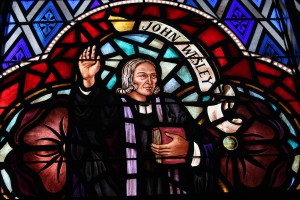
Stained glass window depicts Methodism’s founding father, John Wesley. Photo by Ronny Perry, United Methodist Communications.
As clergy and lay leaders of healthy, vibrant, and orthodox United Methodist congregations, and as teachers preparing the future clergy leaders of our denomination, we welcome the creation of the Wesleyan Covenant Association. In these times of great uncertainty about the future of The United Methodist Church, we believe it is important for orthodox congregations, clergy, and laity to work together, to support one another, and to encourage each other. We long for a church committed to sharing the Gospel of Jesus Christ with the last, the least, and the lost.
Committed to the Wesleyan expression of orthodox Christianity, we believe the church can and must do better. We are alarmed by the growing loss in average worship attendance in many of our annual conferences. We regret the now numerous instances where colleagues in ministry have broken covenant with the rest of the church and sowed the seeds of schism. We are grieved by the actions of annual conferences that have decided not to conform to our Discipline. And we are disappointed in leaders who have failed to maintain the good order of the church. Consequently, the work of faithful pastors and laity has been undermined, healthy congregations have left the denomination, and thousands of United Methodists have gone in search of other places to worship and serve.
We believe the Wesleyan Covenant Association will give orthodox United Methodists hope for the future and serve as a source of encouragement as the church works through a critical period of discernment. We want to serve in close partnership with our brothers and sisters in Africa, Europe and the Philippines. And we want to be prepared to act as one in light of the important work and recommendations of the Bishops’ Commission on the Future of the Church. We encourage all orthodox clergy and laity to remain steadfast and faithful in these uncertain times. We believe the Wesleyan Covenant Association will bind us together and make us a strong, united witness for Scriptural Christianity.
We believe that God is “doing a new thing.” We believe a new and better day is coming for the people called Methodist who are committed to the Lordship of Jesus Christ, the authority of the Scriptures, and the church’s being a missional force determined to reach a lost culture. We yearn to step into this new future together with others of like minds and hearts.
Please visit the Wesleyan Covenant Association website (www.wesleyancovenant.org) to learn more about it. We also hope you will plan to join us in Chicago on October 7, 2016, for the first gathering of the association.
We are confident you will be hearing more about the association in the weeks and months ahead, and we trust you will join us as we band together for the sake of a vibrant, Wesleyan expression of orthodox Christianity.
In Christ,
Billy Abraham, Perkins School of Theology, Dallas, Texas
Bill Arnold, Asbury Theological Seminary, Wilmore, Kentucky
Ryan Barnett, Kerrville First UMC, Kerrville, Texas
Keith Boyette, Wilderness Community UMC, Spotsylvania, Virginia
Larry Bryars, Frazer UMC, Montgomery, Alabama
Madeline Carrasco Henners, Luling First UMC, Luling, Texas
Kenneth J. Collins, Asbury Theological Seminary, Wilmore, Kentucky
Ferrell Coppedge (lay), Mt. Bethel UMC, Marietta, Georgia
Bryan Collier, The Orchard UMC, Tupelo, Mississippi
Jennifer Cowart (lay), Harvest UMC, Byron, Georgia
Jim Cowart, Harvest UMC, Byron, Georgia
Dan Dalton (lay), Dalton & Tomich, Detroit, Michigan
Joe DiPaolo, First UMC, Lancaster, Pennsylvania
Maxie Dunnam, Christ UMC, Memphis, Tennessee
Walter Fenton, Good News, The Woodlands, Texas
Scott Field, Crystal Lake UMC, Crystal Lake, Illinois
John Gaulke, Altoona UMC, Altoona, Iowa
John Gerlach, Trinity UMC, Windsor, Connecticut
Tommy Gray, Asbury UMC, Madison, Alabama
Jeff Greenway, Reynoldsburg UMC, Reynoldsburg, Ohio
Joy Griffin (lay), International Leadership Institute,
Carollton, Georgia
Wes Griffin, International Leadership Institute,
Carollton, Georgia
Daniel Hannon, Christ UMC, The Woodlands, Texas
Jeff Harper, Evangelical UMC, Greenville, Ohio
Tom Harrison, Asbury UMC, Tulsa, Oklahoma
Jeff Jernigan (lay), Powder Springs, Georgia
Randy Jessen, Parker UMC, Parker, Colorado
Rick Just, Asbury UMC, Wichita, Kansas
Charles Kyker, Christ UMC, Hickory, North Carolina
Jessica LaGrone, Asbury Theological Seminary, Wilmore,
Kentucky
Thomas Lambrecht, Good News, The Woodlands, Texas
Jim Leggett, Grace Fellowship UMC, Katy, Texas
Kenneth Levingston, Jones Memorial UMC, Houston, Texas
Greg McGarvey (retired elder), Indiana Annual
Conference, Fishers, Indiana
Andrew B. Miller (lay), Franklin, Tennessee
Pat Miller, (lay) The Confessing Movement, Indianapolis,
Indiana
Carolyn Moore, Mosaic UMC, Evans, Georgia
Mike Morgan, Marion First UMC, Marion, Iowa
Norman Neel (lay), San Augustine, Texas
Martin Nicholas, Sugarland UMC, Sugarland, Texas
Craig Peters, Shueyville UMC, Shueyville, Iowa
Jody Ray, Mt. Bethel UMC, Marietta, Georgia
Rob Renfroe, The Woodlands UMC, The Woodlands, Texas
Chris Ritter, Geneseo First UMC, Geneseo, Illinois
Ed Robb III, The Woodlands UMC, The Woodlands, Texas
Chuck Savage, Sardis UMC, Atlanta, Georgia
Branson Sheets, Covenant UMC, Winterville, North Carolina
Stephen Sparks, Indianola UMC, Indianola, Mississippi
Shane Stanford, Christ UMC, Memphis, Tennessee
Greg Stover (retired elder), West Ohio Annual Conference,
Lake Waynoka, Ohio
Andrew Thompson, Springdale First UMC, Springdale,
Arkansas
Richard Thompson, First UMC, Bakersfield, California
David Watson, United Theological Seminary, Dayton, Ohio
Ken Werlein, Faithbridge UMC, Spring, Texas
Max Wilkins, The Mission Society, Norcross, Georgia
* Church names provided only for identificational purposes.

by Steve | Aug 31, 2016 | July-Aug2016, Magazine, Magazine Articles
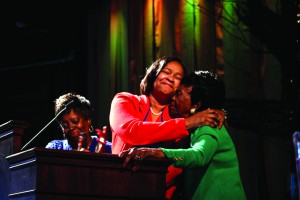
The Rev. Sharma Lewis, center, of the North Georgia Conference was the first African-American woman elected bishop by the Southeastern Jurisdiction. Photo by Ansley Brackin.
During July, the five U.S. jurisdictional conferences elected 15 new bishops. According to United Methodist News Service stories, the newly elected bishops are:
• The Rev. Sharma Lewis: In a historic election, Lewis of the North Georgia Annual Conference was elected bishop by the Southeastern Jurisdiction on the first ballot. She is the first African-American woman elected bishop in the Southeastern Jurisdiction.
“I was called by God and I made myself available, not just to a position, but to follow God’s will,” said Lewis. “I am excited, and I am really humbled. At 52 years old, I am excited that my next phase of life will be as an episcopal leader. I am humbled to the fact that this is historic.” With degrees from Mercer University, The University of West Georgia, and Gammon Theological Seminary, Lewis will lead the Virginia Annual Conference.
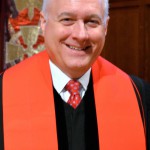
The Rev. David Graves
• The Rev. David Graves, senior pastor of Church Street United Methodist Church in the Holston Conference, was elected by delegates of the Southeastern Jurisdiction. Graves, 58, was elected on the fourth ballot.
“I want to thank you, the Southeastern Jurisdictional Conference, for putting your faith in me,” Graves said after his election. “So we go forth to win people to Christ, see the unseen, transform lives, and help The United Methodist Church change the world.” With degrees from University of Tennessee and Candler School of Theology, Graves will lead the Alabama- West Florida Annual Conferences.
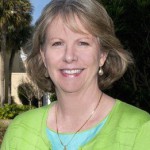
The Rev. Sue Haupert-Johnson
• The Rev. Sue Haupert-Johnson, a district superintendent of the Florida Annual Conference, was elected by delegates at the Southeastern Jurisdictional Conference. Haupert-Johnson, 54, was elected on the 10th ballot. In her introduction address on Tuesday, Haupert-Johnson stressed the need for the church to have room for everyone at God’s table. “I hope you will go and spread a table ‘with a sumptuous gospel feast,’” she bid the delegates. With degrees from University of Florida and Candler, Haupert-Johnson will lead the North Georgia Annual Conference.
• The Rev. Robert Lawson Bryan, of the Alabama-West Florida Conference, was elected by the Southeastern Jurisdiction. Bryan, who serves as senior pastor at Montgomery (Alabama) First United Methodist Church, was elected on the 10th ballot. “It is an honor to be elected by colleagues in our jurisdiction and to see God at work,” he said. ”For the past year, I have referenced Ephesians 2:5, ‘alive together in Christ,’ and ask for your prayers as I seek God’s will as a leader in our SEJ Conference.” With degrees from Tulane
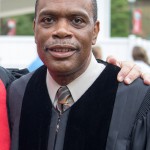
The Rev. Leonard Fairley
University and Emory University, Bryan will lead the South Georgia Annual Conference.
• The Rev. Leonard Fairley, district superintendent in the North Carolina Conference, was elected by the Southeastern Jurisdiction. Fairly, 59, was elected on the seventh ballot. “My request for you, my brothers and sisters, is to pray for me that I might live into the fruit of the Spirit,” he told the delegates. He added that he believes The United Methodist Church’s best days are still ahead. Fairley served as the chief missional strategist and spiritual and administrative leader to 96 churches and 134 pastors in 56 eastern North Carolina counties. With degrees from Pfeiffer College and Duke University’s School of Divinity, Fairley will lead the Kentucky and Red Bird Missionary Annual Conferences.
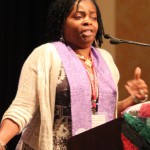
The Rev. Cynthia Moore-Koikoi
• The Rev. Cynthia Moore-Koikoi, district superintendent of the Baltimore-Washington Conference, was elected as a bishop on the 11th ballot at the Northeastern Jurisdiction. She played a pivotal spiritual role in the city following the unrest in 2015 around the death of Freddie Gray in police custody.
“My heart is so full,” said Moore-Koikoi as she stood at the podium. “I don’t have the words. All I can say is glory, hallelujah!” Holding her husband’s hand – the Rev. Rafael Koikoi serves Sharp Street Memorial in Baltimore – Moore-Koikoi said that she knows being elected is a sacred trust. “I’m gonna need your prayers so that I can fulfill that trust,” she said. “I give each of you permission to pull me aside when I might be going astray. God spoke through you tonight, and that’s gonna continue.” With degrees from Loyola College and the University of Maryland, Moore-Koikoi will lead the Western Pennsylvania Annual Conference.
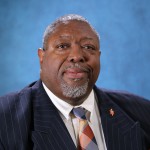
Bishop Frank Beard. Photo by North Central Jurisdiction.
• The Rev. Frank Beard, pastor of Castleton United Methodist Church in Indianapolis, was elected by delegates at the North Central Jurisdiction. He was elected on the sixth ballot. Beard told delegates that in 1968, he was a “snotty-nosed” kid playing around a United Methodist church when its members invited him for cookies and Kool-Aid — and then provided a scholarship so he could attend a United Methodist camp. “That little Methodist Church took me under their wing,” he said. “In 1968, it wasn’t popular for white churches to invite little black boys to be part of their congregation.” Beard said that church blessed him and God called him to the glorious task of preaching the good news.
With degrees from Taylor University, Asbury Theological Seminary, and Christian Theological Seminary, Beard will lead the Illinois Great Rivers Annual Conference.
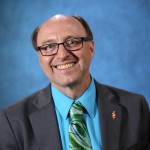
The Rev. David Bard
• The Rev. David Bard, the pastor of First United Methodist Church in Duluth, Minnesota, was elected by the North Central Jurisdiction. Bard was elected during the 10th round. He’s the first bishop to be elected from Minnesota in more than four decades.
Addressing delegates from the podium immediately after his election, Bard gave thanks to God, whose love in Jesus Christ he said touched a 13-year-old in a United Methodist church in Duluth, Minnesota — the same place he now serves. “I pledge with God’s grace and the help of God’s spirit and all of your help to work to make The United Methodist Church the best it can be, for us to be a church that indeed offers hope and healing in a broken and battered world,” he said.
With degrees from University of Minnesota, United Theological Seminary of the Twin Cities, and Southern Methodist University, Bard will lead the Michigan Area Annual Conference.
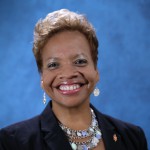
The Rev. Tracy Smith Malone
• The Rev. Tracy Smith Malone, district superintendent in the Northern Illinois Conference, was elected by the North Central Jurisdiction. “To God be the glory. Friends, I stand before you as one who feels very blessed. Blessed for the journey, by your prayers and confidence in my leadership. I am a child of a church. You raised me and formed me. I consider it a privilege and an honor to serve the church,” said Smith Malone after being introduced as a bishop of The United Methodist Church.
With degrees from North Central College, Garrett-Evangelical Theological Seminary, and United Theological Seminary, Malone will lead the East Ohio Annual Conference.
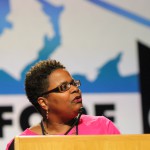
The Rev. LaTrelle Easterling
• The Rev. LaTrelle Easterling, a district superintendent in the New England Annual Conference, was elected by delegates at the Northeastern Jurisdiction on the 17th ballot. Easterling told the member conferences of the Northeastern, “I always, always, always stand on the side of justice, but I draw the circle wide enough for all of us to be there – and when I say all, I mean all.”
With degrees from Indiana University, Indiana School of Law, and Boston University School of Theology, Easterling will lead the Baltimore-Washington Annual Conference.
• The Rev. Dr. Ruben Saenz Jr., director of Connectional Ministries and executive director of Mission Vitality Center of the Rio
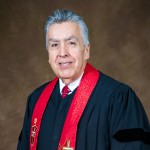
The Rev. Dr. Ruben Saenz Jr.
Texas Conference, was elected by delegates at the South Central Jurisdiction on the third ballot. Saenz said he didn’t set out to be an episcopal leader, but over the years, people have talked to him about the possibility of putting his gifts to use as a bishop. “I think of it as drops in a sponge,” he said. “The first 100 drops are insignificant but after a while, it gets heavy and saturated. It was the affirmation of many people I’ve been associated with over the years.
“It has been a long season of discernment.” He said he didn’t want to be elected just because he is Hispanic but because delegates discerned that he would serve effectively as an episcopal leader. “We are leaders for all peoples,” he said. With degrees from Stephen F. Austin State University and Perkins School of Theology, Saenz will lead the Great Plains Annual Conference.
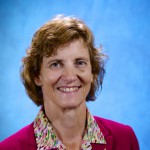
The Rev. Laurie Haller
• The Rev. Laurie Haller, senior pastor of First United Methodist Church in Birmingham, Michigan, was elected by delegates at the North Central Jurisdiction on the 13 ballot.
“I am the first bishop ever to be elected with a visible black eye,” she said, addressing the body after election. “I got it from a stray piece of airplane luggage and decided not to cover it up. It reminds me that I offer myself in utter transparency, honesty, and vulnerability. It reminds me of all who live under oppression and those with wounds so deep that no one knows they exist.” With degrees from Yale University Divinity School and Wittenberg University, Haller will lead the Iowa Annual Conference.
• The Rev. James “Jimmy” Nunn, the director of mission and administration for the Northwest Texas Conference, was elected by
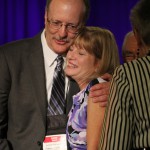
The Rev. James “Jimmy” Nunn hugs wife, Mary, after his election as a bishop. Photo by Todd Seifert.
the South Central Jurisdictional Conference. Nunn, 59, was selected on the 21st ballot. “This is where I need to be, where I need to invest my life,” Nunn said of his call to the position.
Nunn has been mission and administration director of the Lubbock, Texas-based conference since 2011, serving for two years before that as the Northwest Texas Conference’s director of church development. With degrees from McMurry University and Asbury Theological Seminary, Nunn will lead the Oklahoma and Oklahoma Indian Missionary Annual Conferences.
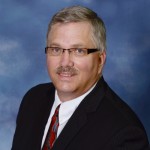
The Rev. Robert “Bob” Farr
• The Rev. Robert “Bob” Farr, director of of congregational development for the Missouri Conference, was elected by the South Central Jurisdiction. Farr, 56, has served as the director of the Center for Congregational Excellence since 2007, guiding 35 church starts and overseeing more than 150 Healthy Church consultations in the Missouri Conference. He also has led 128 individual church consults in 29 conferences across the connection.
“It was an emotional roller coaster,” Farr said of the extended ballots. “It meant a lot to have the support from the conference, the clergy, and the lay people here.” With a degree from Perkins School of Theology, Farr will lead the Missouri Annual Conference.
• The Rev. Dr. Karen Oliveto, senior minister of Glide Memorial United Methodist Church in San Francisco, was elected by the Western. With degrees from Drew University and Pacific School of Religion, Oliveto will lead the Rocky Mountain and Yellowstone Annual Conferences. (See pages 8-12.)
Profiles adapted from United Methodist News Service reports. Special thanks to contributing news writers Sybil Davidson, Annette Spence, Mary Catherine Phillips, LeeAnne Thornton, Melissa Lauber, Erik Alsgaard, Christa Meland, Joey Butler, Beth DiCocco, David Burke, and Kathy L. Gilbert.

by Steve | Aug 31, 2016 | July-Aug2016, Magazine, Magazine Articles
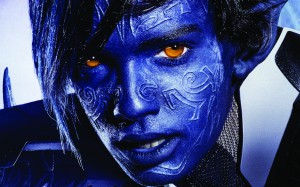
Kodi Smit-McPhee portrays Nightcrawler in X-Men: Apocalypse (Twentieth Century Fox).
By Steve Beard-
When moviegoers were first introduced to Kurt Wagner more than a dozen years ago in the blockbuster film X2: X-Men United, he was darting through a legion of hapless Secret Service officers at the White House. At first glance, he appeared as a fierce blue demon-looking character that was able to disappear into thin air and reappear across the room.
For those who don’t follow the alternative universe of comic book imagination and discussions of “mutants,” Wagner is one of the most fascinating characters introduced in the X-Men franchise.
Wagner’s appearance in X2 (played by Alan Cumming) delighted comic book fans. His character is better known as Nightcrawler (or Fuzzy Elf to his friends). As a “teleporter,” the German-accented mutant is able to morph into a puff of blue smoke and transport himself with the speed of sound. With acrobatic grace, he cuts quite an image with his dark blue skin, tail, pointy ears, three-fingered-hands, and funny teeth.
There was more than a ripple of thrill coursing through the veins of comic book fans when it was announced that Nightcrawler would reemerge in this year’s blockbuster X-Men: Apocalypse. Mysteriously, the character has been absent from the last five films in the series.
Nightcrawler has been one of Marvel Comics’ most unique and complex superheroes since 1975. For those outside the X-Men cult of fans, the series revolves around a cast of characters that have some form of genetic mutation that manifests itself through extraordinary abilities. They have names such as Wolverine, Cyclops, Magneto, and Rogue. The mutants can control the weather (Storm), blow freezing cold wind (Iceman), or walk through walls (Kitty Pryde, aka Shadowcat). As you would expect, they are treated as freaks and ostracized from society. The storyline revolves around the struggle between the humans and mutants and the need to fight prejudice, suspicion, and bigotry when dealing with people who may have different looks or talents.
Perhaps the most intriguing characteristic about Nightcrawler is that he is a mutant of faith — a devout Christian. Out of all the myriad of cartoon superheroes created in the last fifty years, very few have articulated or been identified with a specific religious faith.
There have, however, been exceptions to the rule. In 2002, it was revealed in the comics that Ben Grimm (aka The Thing) of The Fantastic Four was Jewish. Clark Kent (aka Superman) was raised Methodist. In the movie Daredevil, crucifixes and other religious iconography flood the screen (as well as visits to the confessional) in order to convey Matt Murdock’s struggle between vigilantism and his boyhood Catholic faith.
To their credit, the screenwriters, director, and producers of X2 allowed Nightcrawler to retain his purity of faith and hope. They skipped the subtle, read-between-the-lines type of allusions to his Christianity and let him express full-metal devotion. Nightcrawler takes refuge in an abandoned cathedral in Boston, festooned with statues of Jesus. When he is nervous, he holds a crucifix and says the rosary in German. When he needs to summon inner strength, he recites the Lord’s Prayer. When the group is confronted with tragedy, he pastorally quotes Psalm 23.
Awash in hellfire, brimstone, and lazerbeams, X-Men: Apocalypse was this summer’s big screen spectacle loaded with melodramatic screen banter about false gods and Four Horsemen, all bursting out of the rubble of ancient Egyptian cults. While some observers rightfully complain when Hollywood turns its back on religion, it must be pointed out that some films overdose on discombobulated spirituality. Apocalypse may well have been one of those films.
In the midst of the metaphysical chaos of an X-Men film, you can thankfully depend on the pointy-eared blue character (this time played by Kodi Smit-McPhee) with the tail to make the sign of the cross and pray: “Dear Father, hold me in the light of God. Protect me from danger. Save me by your command. Listen to my prayer and keep me safe.”
Quite simply, Nightcrawler is one of the most devout and unconventional Christian characters that has ever been portrayed on the big screen. Furthermore, his distinct characteristics span his portrayal in comic books, graphic novels, and an animated film. He talks righteously about sin and the power of faith, without the slightest hint of holier-than-thouism. Although he has every right to be angry at humans for their bigotry, he chooses to help them. He has fears, but he acts with courage through the power of prayer. He quotes the Scripture to find strength that his genetically mutated special powers cannot give him.
In the movie version, Nightcrawler’s faith is further highlighted in that his body is covered in tattoos, one for each of his sins. He calls them his “angel marks.” In a form of penance, they are self-inflicted ancient Enochian symbols considered to be an angelic alphabet.
Good-natured swashbuckler
When Nightcrawler first began with the X-Men, he was not conceived as a religious superhero. He was a swashbuckling adventurer with a good sense of humor and a special charisma with the ladies. He even became the leader of the British superhero group Excalibur.
His unique look always made him appear to be something that he was not — namely a demon. The creators used his image to further press their point that prejudice and bigotry brutally cloud our judgment in being able to truly judge a person. This was only heightened when Nightcrawler began quoting Scripture, praying, and hanging out in abandoned cathedrals. He began to be mentored by a priest at Church of Michael the Archangel in Brooklyn and studying for the priesthood.
For a period of time in the X-Men comics, Nightcrawler was shown wearing a clerical collar and even presiding over the funeral of a friend. In the midst of his theological studies, he also struggles with his faith, the tremendous injustice that he sees all around him, and what it would mean to become a priest.
In the graphic novel Uncanny X-Men Vol. 1: Hope (2003, written by Chuck Austen), Nightcrawler is staring at a life-size crucifix in St. Patrick’s Cathedral when he says, “Your death was intended to show us a shining example of how we should live in loving union with you and those around us. Yet even those of us who hold you deepest in our hearts — fail — in keeping true to your divine word.”
In continuing his confession, he says: “Clergy, parishioners, priests — me. I have such thoughts — feelings I cannot escape — the desires for the touch of a woman.” While the temptations of the flesh weigh heavy on his conscience, Nightcrawler’s vastly more threatening challenge is against the racist and religious humans of the Church of Humanity, a Ku-Klux-Klan type of anti-mutant organization.
With the gritty and heart-torn anxiety of the Psalmist, his poignant monologue continues by unleashing his frustration on a seemingly standoffish God. “And now another Holy War is brewing — more fools take up weapons of murder in Your name. And You allow it. Perhaps even encourage it. If we take You into our hearts, does that mean fighting and killing in Your name — or not fighting and being killed in your name? Which is the right answer? And what purpose does it serve to torment your most faithful when the goal is maybe one day sitting beside you — alone — possibly forever apart from the ones we love and desire — who chose wrongly or failed your uncertain tests?”
The scene concludes with Nightcrawler looking at his crucified Jesus and saying, “When next we meet, I expect answers.”
Did God give up on the mutants?
With the heightened popularity of the X-Men movies, a DVD collection of animated TV episodes from the early 1990s was released entitled X-Men: The Legend of Wolverine (Buena Vista, written by Eric Lewald, Mark Edward Edens, and Sidney Iwanter). It includes an entire episode devoted to the origin and theological disposition of Nightcrawler.
The story takes place within a monastery in a small Bavarian village in Germany. Three of the X-Men (Wolverine, Gambit, and Rogue) find themselves being aided by monks in the aftermath of an avalanche. Having been mistaken for a demon by the townspeople because of his looks, Nightcrawler explains to Wolverine and his friends that his genetic mutations were evident from birth and that the villagers chased him and his mother out of town.
His mom (Mystique) also abandoned him as a child (in the comics, she throws him over a waterfall) and a family of travelling performers took him in. When he was young he was able to work in the circus, but he was still treated as an outcast, “shunned and hated.” In talking with Wolverine, Nightcrawler says, “Though all people are flawed and struggle with the capacity for sin, none likes to be reminded of our shared human weakness. My appearance does not make it easy.”
“Don’t it make you crazy?” Wolverine asks with incredulity.
“It did once, but then I found peace by devoting my life to God,” said Nightcrawler. “He directed me to this place [the monastery] where they value the character of my heart, not my appearance.”
This only sends Wolverine further into a rage. “What are you talking about? God gave up on us long ago!” Nightcrawler counters, “No, my friend, God does not give up on his children — human or mutant. He is there for us in our times of joy and to help us when we are in pain — if we let Him.”
Later, Nightcrawler tells Wolverine, “We are alike, you and I — angry at the world. My pain drives me to seek God, yours drove you away.” Wolverine is further infuriated when he asks why God would have allowed him to be treated so badly. “Our ability to understand God’s purposes are limited,” says Nightcrawler, “but take comfort in the fact that his love is limitless.”
The episode concludes with Wolverine kneeling in a French cathedral reading the Bible and saying, “I will give thanks to you O Lord. Though you are angry with me, your anger is turned away and you have comforted me. I will trust you. I will not be afraid.”
Not a bad message — especially coming from a thoroughly unconventional superhero.
Steve Beard is the editor of Good News.
























